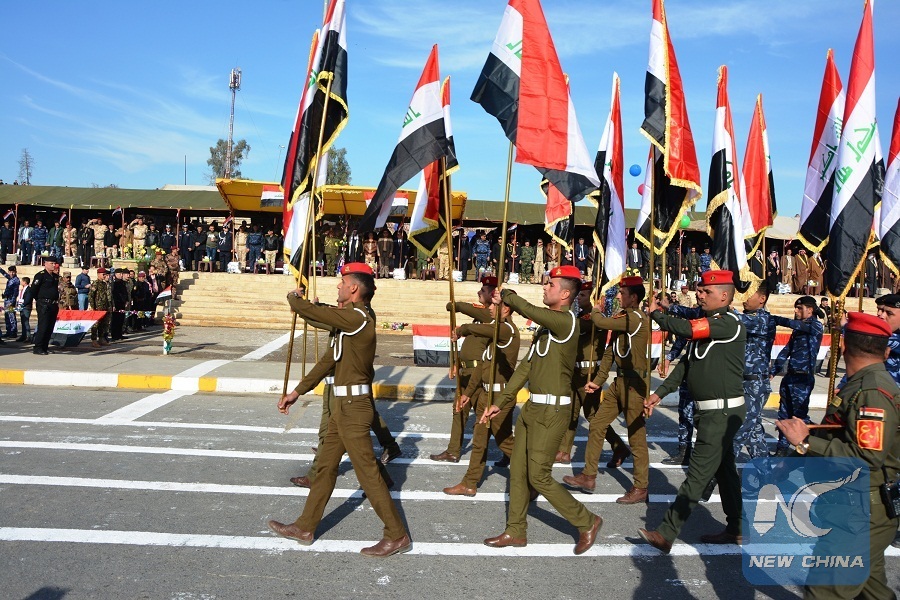
Iraqi military stages parade in Mosul celebrating victory over IS.On Dec. 9, Iraqi Prime Minister Haider al-Abadi officially declared full liberation of Iraq from the extremist IS group after the security forces recaptured all the areas once seized by the extremist group. (Xinhua/Khalil Dawood)
BAGHDAD, Dec. 26 (Xinhua) -- The hard-won victory in 2017 over the terror group Islamic State (IS) by Iraq is overshadowed by a growing conflict with the Kurds following a controversial independence referendum.
In early 2017, Iraqi forces advanced into the city of Mosul, IS' de facto capital, after grueling fighting with IS militants armed with booby-traps, snipers and suicide bombers.
On July 10, Iraqi Prime Minister Haider al-Abadi, who is also the commander-in-chief of the Iraqi forces, formally declared full liberation of Mosul, after nine months of fierce fighting.
The recapturing of Mosul was a great victory and turning point in the Iraqi anti-terrorism war, as it symbolized the collapse of IS.
After the liberation of Mosul, Iraqi forces launched several offensives to dislodge IS militants from remaining smaller redoubts in Tal Afar area near Mosul, Hawijah Pocket in southwestern Kirkuk, al-Qaim and Rawa areas near the border with Syria in the western province of Anbar.
On Dec. 9, Abadi officially declared full liberation of Iraq from IS militants, sealing a final victory in the three-year war.
"I announce to the Iraqi people and all the world that our forces have reached the last redoubts of Daesh (IS) and have raised the Iraqi flag over areas of western Anbar (province) which was the last occupied land by IS," Abadi said in a televised speech.
But there are still small groups of IS militants hiding in urban areas as sleeper cells or fled to deserts and rugged areas to seek a safe haven. They are still capable of carrying out attacks from time to time against the security forces and civilians.
INDEPENDENCE REFERENDUM TURNS DISPUTE INTO CONFLICT
For years after the U.S. invasion into Iraq in 2003, the semi-autonomous region of Kurdistan in northern Iraq has been at odds with the Iraqi central government over wealth distribution and lands outside the region.
The Kurds consider the northern oil-rich province of Kirkuk and parts of Nineveh, Diyala and Salahudin provinces as the "disputed areas" which they want to be incorporated into their Kurdish region, a move fiercely opposed by the Arabs and Turkomans living there and by Baghdad.
The ethnically mixed Kirkuk province, located in the south of the Kurdish region, is rich in oil resources and has a population of estimated 1, 25 million. It has been controlled by the Peshmerga since 2014.
The dispute between Baghdad and the region escalated into conflict after the Sept. 25 referendum that approved the independence of the Kurdistan region and the disputed areas.
But the Kurds later lost the battle of Kirkuk, as the independence move is opposed by most countries, especially by Iraq's neighbors such as Turkey, Iran and Syria, which fear it will threaten their own territorial integrity, as a large population of Kurds live in those countries.
On Oct. 16, Abadi ordered government forces to enter the oil-rich Kirkuk province and took control of the city of Kirkuk, as well as key military sites and oilfields.
This undermined the Kurds' hope of creating a viable independent state, forcing Kurdish leader Masoud Barzani to show conciliatory signals, including freezing the outcome of the referendum. But Abadi said Baghdad will accept only cancelation of the controversial vote before any negotiation between the two sides could begin.
There have been catastrophic consequences for the Kurdish region after the referendum as the Kurds lost much of their gains that they got, especially after the 2003 Iraqi war launched by the U.S.
The defeat in Kirkuk put Barzani under high pressure, as many Kurds and Barzani's rival political parties held him responsible for the loss.
On Oct. 29, Barzani told the Kurdish parliament in a letter he was to step down as president of the Kurdish region from Nov. 1. Iraq's Supreme Federal Court on Nov. 20 issued a verdict, ruling the referendum as "unconstitutional."
INTERNAL RIFT SURFACES IN KURDISTAN FOLLOWING BARZANI'S RESIGNATION
Soon after Barzani's resignation, his frustrated supporters attacked and looted offices of Kurdish political parties opposed to Barzani in Duhok province, while other protesters stormed the Kurdish parliament building when it met to approve Barzani's resignation.
The political division and economic crisis led hundreds of Kurds to take to streets on Dec. 18 in several cities and towns in Sulaimaniyah province in northeastern Iraq.
The protests turned violent later as some demonstrators attacked the offices of all five Kurdish political parties, and set fire to the office of the ruling Kurdish Democratic Party (KDP), headed by Barzani.
Five people were killed and more than 100 others were wounded during violent clashes between Kurdish protesters and security forces.
On Dec. 20, two Kurdish parties, Gorran and the Islamic Group of Kurdistan (Komela), decided to withdraw from the Kurdistan Regional Government (KRG). Kurdish Parliament Speaker Yousif Mohammed, from Gorran Movement, also decided to quit after a demand by his party.
However, it is widely expected that Abadi will continue to take measures against the Kurdish region to strip it of more power.
The negotiations between Baghdad and Erbil are expected to start in the coming year to resolve the referendum crisis, as Iraq will hold national elections on May 12.
The future of the Baghdad-Erbil standoff largely depends on the new generation of Kurdish leaders after the death of the veteran Jalal Talabani and the resignation of Barzani.

